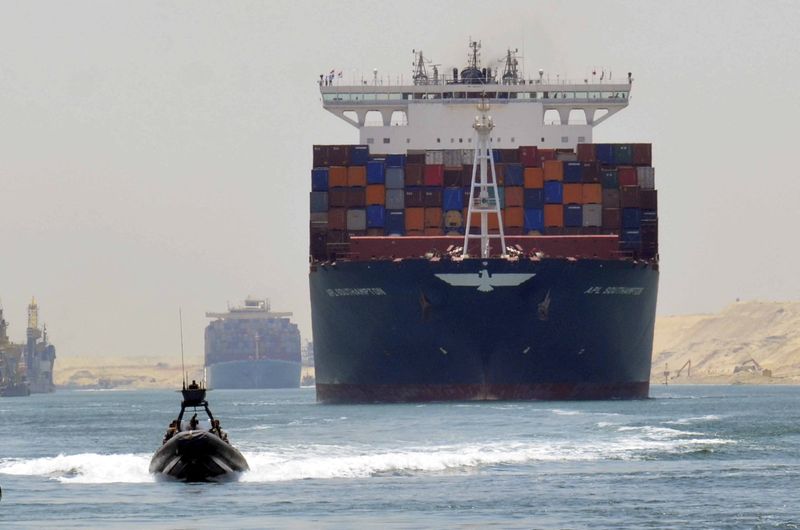(Reuters) – Shipping companies remain in the dark over a new international navy coalition being assembled by the United States to combat attacks in the Red Sea, with many vessels continuing to avoid the area or cancelling contracts, sources said on Wednesday.
The sources, who include shipping and maritime security officials, say few practical details are known about the initiative launched on Tuesday by Washington or whether it will directly engage in the event of further armed attacks at sea.
Iran-backed Houthi militants in Yemen have since Nov. 19 stepped up attacks on vessels in the Red Sea to show support for Hamas as Israel’s military offensive in Gaza continues.
Their leader said on Wednesday the group would strike U.S. warships if it is targeted by Washington.
Houthi fighters have fired missiles and launched seaborne assaults on ships from fast boats. Missiles fired have been repelled by U.S. warships.
“There are still a number of unknowns with the coalition. We don’t know exactly how many warships will be involved, how long it will take those vessels to get to the region, or their rules of engagement and the actual protection scheme that will be put in place,” said Corey Ranslem, chief executive of British maritime risk advisory and security company Dryad Global.
“Globally this is a fairly small area, however providing protection to commercial vessels in this region could be a major undertaking depending on the number of vessels along with any changes to the Houthi tactics.”
On Nov. 19, Houthi commandos landed on car carrier Galaxy Leader by helicopter and took it back to Yemen’s northern Hodeidah port. The vessel and its crew are still being held.
The attacks have disrupted a key trade route that links Europe and North America with Asia via the Suez Canal and caused container shipping costs to rise sharply as companies seek to ship their goods via alternative, often longer, routes.
Dryad’s Ranslem said the threat to commercial shipping was likely to continue as the war goes on.
“A number of global shipping companies are diverting around Africa or completely pausing operations within this region. If the coalition efforts are not effective we expect more shipping companies to divert around the Cape,” he said.
Traffic through the narrow Bab al-Mandab strait connecting the Red Sea and the Gulf of Aden fell by 14% in the Dec. 15-19 period compared with Dec. 8-12, according to data from AIS ship tracking and maritime analytics provider MarineTraffic.
U.S. Secretary of Defense Lloyd Austin, on a visit this week to Bahrain, home to the U.S. Navy’s headquarters in the Middle East, said Bahrain, Britain, Canada, France, Italy, the Netherlands, Norway, Seychelles and Spain were among nations involved in the Red Sea security operation.
The group will conduct joint patrols in the southern Red Sea and the adjacent Gulf of Aden.
“Will they do anything except swat the missiles out of the sky? If that’s all, then will it give the assurances that are needed for shipping companies? We don’t know yet,” said one shipping industry source.
“The market needs to see it have some success or concrete action,” another source said.
The International Chamber of Shipping said it expected the new task force to enable a “co-ordinated effort across a large number of military warships that will provide a significant suppressive response”.
RED SEA VOYAGES PAUSED
Container shipping companies in particular have continued to pause their voyages through the Red Sea, using instead a route around Africa that adds days to journey times and raises costs. That in turn has stoked worries about delays to deliveries and price rises that could trigger a new bout of global inflation.
“We will continue to re-route all vessels planned until Dec. 31. Then we will reassess the situation and decide,” a spokesperson for Germany’s Hapag Lloyd said.
Another shipping industry source said some ship owners had cancelled charter contracts through the Red Sea citing “unsafe navigation”, or were requiring a risk premium on top of reimbursement for rising war risk insurance cover.
A U.S.-led Combined Maritime Force already exists, comprising 39 countries and based in Bahrain. Its main focuses are “counter-narcotics, counter-smuggling, suppressing piracy, encouraging regional cooperation”, according to its website.
The new coalition will initially be led by the United States and Britain and other members over time “will be persuaded to do their bit”, said Gerry Northwood, a consultant with maritime security company MAST and former British navy captain.
“So, industry will have to lump it,” said Northwood, who once commanded warships in the region.
“The rules of engagement will be configured to allow the ships to defend shipping against surface and air threats. Taking the fight to the Houthis ashore will be for a different operation.”



